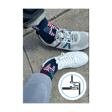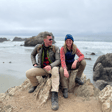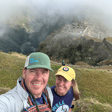Become a Creator today!Start creating today - Share your story with the world!
Start for free
00:00:00
00:00:01

Ep. 35: A special chat about life with a special guest
Stephy Steph and Bobby chat with Dr. Brett Kessler who is the new President-elect of the American Dental Association on his 25th anniversary of being in recovery. The conversation was prompted by recent suicides in the dental profession. This is a wide ranging chat with a range of emotions and covers connection, fear, suicide, addiction, and also living a life best lived.
Transcript
Introduction of Show and Guest
00:00:02
Speaker
No, we have the official. No, we blend in the other music. Actually, it's kind of like, I was trying, I was going football a little bit. Who are we? We are Between Two Teeth. I'm Steffi Stuff, and this is Bobby. And Bobby, who do we have all day? We have a super special guest, the very new president-elect of the American Dental Association, Dr. Brett Kessler. He is Between Two Teeth.
00:00:25
Speaker
He's got a backup jacket for reasons we won't get into. It started as a backup jacket. I know it fits you so well. I feel like you have room in there.
Dr. Kessler on New Role Excitement
00:00:35
Speaker
I feel like I can fill in when one of the two teeth can't make it. I can come in. Am I already? Yeah, I think that's possible. Am I already getting... Yes, exactly. Are you serious? I'm already getting replaced. You've been president-elect for like a day and a half and he's already replacing me in between two. It's like Johnny Bravo from the Brady Bunch.
00:00:53
Speaker
That's right. I can't believe I'm looking at three B2 tooth jackets. That's awesome. So we are so blessed that you allowed us to come here and kind of enjoy your start. And we're actually in a pretty special spot. We're in the boardroom and I know... Shh, don't tell anybody. I'm supposed to get it when we get sneaking. And if you see the insignia or the emblem behind us, like everyone, this is where the pictures happen. So this is a really cool spot. Well, this is where pictures happen. This is where important things are.
00:01:20
Speaker
happening, and have happened, and will happen. So it is special. That's not lost on us. But man, thank you. Thank you for what you've done so far. Are you excited? What's going through your mind as you're sitting here drenched in sand? The jacket's clouding all my time. There's like vortex going on. Exactly. It's easy to do that.
00:01:43
Speaker
No, I'm really on cloud nine and just to be honored. I'm honored to be in this in this position to really maximize my impact on the profession through my position and you know and you know this is day I'm sorry week two the start of week two of my my reign I guess and very
00:02:04
Speaker
Just very blessed to be here. Man, that is awesome. We're blessed to be here too, and we love, you know, we've been walking around this area, big beaming smile on your part. You know, you can just feel
Reflections on Trustee Experience
00:02:15
Speaker
the energy. You're going to do a lot of good for this profession, especially in the next couple of years. Why did you want to do this? I'm still asking myself that. After I won, my first thought was, oh my god, what have I done? Now what do I do?
00:02:27
Speaker
You know, I think my four years as a trustee, I think those were the maximum work years. We did a lot of stuff. We went through COVID, came out of COVID.
00:02:42
Speaker
We've got a lawsuit against a dental insurance company that's working through, and we've expanded access to care in big ways. And this MLR initiative that's going across the country will really make a difference in benefits and how they're utilized. Just the medical loss ratio for insurance. The medical loss ratio for insurance. So it's been a great four years, and these two years,
00:03:11
Speaker
Like I said, what have I done? What have you done? To be in this position, it's kind of crazy. But Ray asked me to, what are my goals? And so I just started writing. And six pages later, I sent it over. And him and Linda, the current president, Linda Edgar, we're in line with so many things. And we're about to make some bigger changes.
00:03:37
Speaker
You know, I ran on the changemaker platform and... Is that easy or hard? Changes are difficult for humans, especially for dentists who are human. Everyone wants change. Everyone wants change, right? But everyone wants change, but when it comes down to does everyone want to change and have what it takes to change? No one wants to change. So that's the most important part of the change message, is I think everyone wants something a little different, but no one really knows. Some people don't know how.
00:04:07
Speaker
And some people know how, but then when it comes down to actually getting the work done, it's tough. There are so many nuanced parts to everything. Like you talk insurance reform, for instance. There are so many moving parts and legal issues and financial issues. And with many issues, perfect does not exist. And sometimes you look at it and say, well, if I can't get perfect, I'm going to take my toys and I'm going to go home.
00:04:35
Speaker
versus what can we get accomplished? What can we do as a profession? How do we appropriately interact with other stakeholders?
Challenges of Implementing Change
00:04:45
Speaker
That kind of stuff. I'm glad I'm not perfect because it doesn't exist. Simon Sinek talks about your what, why, and how, or what, how, and why. And a lot of times he funnels it down to most people know what they're going to do. Fewer know how they're going to do it. And a very small amount know why.
00:05:03
Speaker
But when we talk about change, what I'm starting to think about is it is the how that's so difficult. Because you're right, there are so many moving parts. And we talk about larger organizations trying to get larger organizations to change. And you mentioned this last night in relation to Oprah and some of the lessons kind of from her story is when we break down the how, start with changing one person or one person's mind. And you never know where you can go from there. Right.
00:05:31
Speaker
subtly change that to, say, to inspire one person at a time. And they get to walk with that inspiration and decide what to do with it. I love that. They get their own. Right. But I also say the how is difficult, but we all kind of know what our why is, but it's very difficult to articulate because it's visceral. And I've learned over the years in my own growth trajectory, my why is,
00:06:01
Speaker
I'm a catalyst for positive change in the world. And I look at everything I do, it kind of fits right into that. And now that I'm clear on that, my how and my what get much easier. And that's one of the reasons why I ran for president-elect. That is awesome. Be a positive person. I get a little chills. I'm like, oh my gosh. When you said visceral, I'm like, yes. That's so true. It's a different part of your brain. It's hard to articulate it. And what I would say, we talk a lot. We actually lecture on communication.
00:06:29
Speaker
We do talk a lot, too. We do talk a lot, if you believe we like correct communication. Mostly filler. Please don't lecture me. Mostly filler, yes. We can't lecture where you got sat jackets on. I get a visceral feeling. Yeah, exactly. Here's what we talk about, and it's something that I learned from someone. There's lyrics, the words you say, and then there's a melody, how you say it. And people often forget what you said, but they don't forget how you made them feel.
00:06:57
Speaker
And I've seen how you make people feel and the impact that you have on people. And it's going to be an interesting journey to see how things play out over the next couple of years as you try to change an organization. And there's lots of people that want change.
00:07:17
Speaker
And I love when you talk about lyrics and melody, I think of songs. So when I first hear a song on the radio, I hear the melody. We're very different. Actually the first five times I hear the melody until I start, once I know I like the melody, but then is only, that's when I start listening to the words and the artist's message, what they actually wanted to talk about would never have gotten to me unless I like the melody. How crazy is that?
00:07:41
Speaker
I'm a melody guy. I don't pay attention to words. I don't pay attention to a lot of stuff unfortunately sometimes. But that's my point actually. I think most people are melody people and you have to have the right melody before your words can get home. Yeah. My middle daughter is applying for colleges right now and she wrote in her personal essay about music.
00:07:59
Speaker
You know, and she said music is what emotions sound like. And this is from a 17-year-old kid. I mean...
Music's Emotional Influence
00:08:08
Speaker
So music is powerful. You know, when we have patients that are anxious and they're hypertensive in our office, we actually have very specific songs that we play that have some data to support that actually brings down the heart rate. Master puppets by Metallica.
00:08:23
Speaker
that's one of them no what was that you said your daughter said what about emotions and music is what emotions sound like yeah
00:08:37
Speaker
Yeah, I mean, just the range of different songs. I mean, that's where people get through. I know some people have said they've listened to Eminem or people like that in that genre to get through really tough times. Yeah. And so I can't help but think that's an aligning in some way. Absolutely. I think is, you know, and you have done and continue to do a lot in the well-being space.
00:08:59
Speaker
with what you're doing. Steph, you're an American Dental Association Wellness Ambassador. I'm on the DWAC, the Dental Team Wellness Advisory Committee. Took me ages to figure out how to say that. So we're all involved in that space. We really try to push connection. And what I found in me as a state board regulator
00:09:23
Speaker
When people lack connection, some really tricky things happen. And we love being connected. We're blessed that we connected to you. We actually delivered a watch band to your Max and Cusco Peru. My son.
00:09:39
Speaker
Yes, we were literally like here on a Friday and we're in Peru on a Saturday. After the Wellbeing Summit. After the Wellbeing Summit. And it's cool, it's kind of fun meeting kiddos because they sound like you and they somewhat look like you. And I'm like, oh my gosh, this is BK 2.0? It really kind of freaked us out. We're like, oh, yes. Yeah. Pretty cool.
Journey to Sobriety
00:10:04
Speaker
I just want to talk about the wellness. Today actually is my
00:10:07
Speaker
25th anniversary of taking my last drink. Today's my sober birthday. Congratulations. And that was an inflection point in my life where I was at a turning point across roads where
00:10:20
Speaker
Should I live or should I die? And I was blessed to choose the path of life and that's really the time where I got inspired to live my best life because I was so locked up in my addiction. And I share this openly because I know there's a lot of people struggling and every time I share it I never regret it because people hear something that they connect with and they're not alone.
00:10:44
Speaker
And in addiction and mental illness, you're totally isolated. And you can't see past your brain. And the connection, what I got early on, there were angels that just appeared to give me a message and guide me along a way that I never imagined. And my life has turned out in ways that I never, ever imagined. And I'm so grateful for that. And yeah.
00:11:11
Speaker
I got to connect with a bunch of my recovery friends this morning before you guys and I get to connect with you guys today. And so it's a great day. It's a good start of a day. I don't even know what to say and how to follow that up. That's huge. That's a huge milestone. And I love that that milestone's happening and you're in the position you're in. All of that is full circle and I don't know, just kind of hope and life and it doesn't have to be perfect.
00:11:40
Speaker
to get real big success. There are so many people hurting and suffering right now. And I think a lot of them are doing it in silence. And I think they can feel alone and just not have people to reach out to. And hearing your story and to what Steph said, the impact, the simple fact that you were sitting in this chair in the boardroom at the ADA
00:12:11
Speaker
25 years ago today, I'm hoping that is just a shining light for so many people. Yeah, I hope so too. Because I remember what it was like to be in that isolation. And you saw absolutely no hope, a very dark point. And what I would say, your experiences, and you and I interacting,
00:12:35
Speaker
helped me at the state board level to make some changes in Texas to de-stigmatize people getting help. And if we didn't have that connection, that probably would not have happened, at least at this time. It's just you never know where the road in life will take you.
00:12:57
Speaker
and it can get a whole lot better. And I think we've talked about it, how all of our experiences, all three of us have had challenges that certainly made us better today than if we didn't have those. Yeah, it's testing our resilience and the experiences that we experience create the trajectory.
00:13:24
Speaker
And I talked about this during my campaign for the ADA, is that we have big issues for the profession, big issues for the organization. We can't solve all those big issues in one swoop. And just like my recovery 25 years ago, I take it one day at a time.
00:13:44
Speaker
And it's 9,131 days. That's the way I look at it. And tomorrow is 9,132. And so the ADA's problems, too. They're not going to solve it in one suit, but we can move forward a little bit and keep moving forward. And as we do that, 25 years from now, it's going to be a different organization. How do you think endurance sports have played into your mindset with what you were just saying as one step at a time? That's a long play.
00:14:12
Speaker
That's a long run. And I talked about this, too, on the campaign trail that I viewed the whole campaign as an Ironman. And when I was in Hawaii in 2018, I came off the swim, a 2.4-mile swim. I came off the 112-mile bike. And I look at this marathon looming large in front of me. I've got eight hours of heavy exercise already in the day. There's no way I can run a marathon.
00:14:35
Speaker
but I could run one mile. And I know there's an aid station at that mile where I could replenish, and then I could run another mile. And before I knew it, I was at the finish line. And so the mindset, when I got to Ironman Day, yes, it was a physical challenge, but it was much more of a brain game than a physical game. What about, and just hearing you talk about that, just looking at mindsets, and I know a lot of young people who do get into
00:15:02
Speaker
kind of maladaptive coping mechanism strategies when stress comes up in their lives. Some of that, I can't help but think, is I don't want to just sum it up as impatience, but not being able to be okay with one step at a time. You want it all right now. And if it's going to take more than two years, why am I even trying?
00:15:24
Speaker
Well, it's the mark of a high achiever. Especially for us as dentists, we are high achievers. And we're used to seeing results from our efforts, immediate and profound results. And perfect. And perfect. Perfection is instilled in us in dental school. And it's ridiculous to do that because we're, especially in dental school, we're just neophytes. We're early on in the game, and we've got some growth to do to become who we are.
00:15:54
Speaker
But I don't know, I try and find a win in every day and small wins, recognize the moments and, you know, and I journal a lot so I kind of write those journals in my journals and, you know, and that trained me to see the good in every day even though it may not be profound and, you know, and big but, you know, the small victories lead to large victories.
00:16:21
Speaker
And I think, I think unlearning, we're in at least my generation and younger, we are a generation or generations of immediate gratification. So when we look at our education cycles, every four years, a big plus happens. When you get out of dental school or residency, that doesn't necessarily happen anymore. There's no big
00:16:42
Speaker
after four years, oh, we're gonna celebrate you. You've achieved this thing. So you're just looking at, now there's just a long runway, and wait, when are you celebrated? Or when do you know you've achieved something? And so I think that's where endurance sports, or at least the endurance mindset, little step at a time, and this is a long haul, and that's okay.
00:17:06
Speaker
So in dentistry, I celebrate with patients. First of all, I'm honored that the patients are entrusting me with their care. And when I deliver a set of veneers or a denture, and it changes their life. And my whole team gets to celebrate that.
Creating Personal Milestones
00:17:24
Speaker
Or if a crown that just looks great and it fits or a filling, I got to create a
00:17:29
Speaker
carve a filling on a patient that looks amazing. The patient may not appreciate it, but I do. 25 years ago, I wasn't going to be doing dentistry anymore. As you talk there, this is one thing that Max and you, I think, have in common, your sign, is the way you guys create your own milestones.
00:17:49
Speaker
You create your own happiness. You don't wait for somebody else to tell you. Max definitely doesn't. And it's cool for me because, I don't know, for me going through it, I always thought somebody else had to tell you, you did a good job. Someone had to tell you, hey, you got an A on this exam. And so getting out there and like you're saying, you can create your own milestones. That's important. I think seeking external validation is a fool's errand that you'll never satisfy.
00:18:16
Speaker
because there's never enough. You have to tell me that about 10 more times. This is two or three. Maybe steps. No, but when it's internal, it's more profound, and it's enough. At some point, I recognized I am enough. And in this whole process of this election year, I've been stretched in ways that I've never, ever imagined.
00:18:44
Speaker
You know, and as I'm outside of my comfort zone, it's not, you know, it's not always pretty, you know, but I had a good team around me to keep pushing me forward. And I love the person that I'm becoming as a result of this challenge. And, you know, and so it's, you know, it's a little by little by little. And I step back and I write about it.
00:19:09
Speaker
you know, now compare my writings from now till, you know, a year from a year before, you know, it's a different, it's a whole different paradigm. I love when you said that, and I heard you say that before, you love the person you are becoming. We all have
00:19:26
Speaker
such an ability to continue to evolve and change and have experiences. And some of those experiences are going to be absolutely terrible. I had a relation. That's growth. That's growth. I have learned so much through struggle. And it has been so challenging and so difficult. And having dark times.
00:19:51
Speaker
But you're better on the other side. Yeah. This too shall pass. You know, the dark times and the bright times. It's just a wave of life. There's a book out there by Adam Grant called Think Again. And they talk about the need for us to keep changing, not just how we think, but our stances in life. And so when you talk about going back and rereading journal entries from a year before,
00:20:17
Speaker
So I'm glad they're different. That's good. If they were exactly the same, then what have we done in a year? We've stuck in a rut and we've decorated that rut. Very beautiful, by the way. Pretty proud of it. It's comfortable, but it's our rut. It's comfy. We like our rut. There's a lazy shirt in here. Yeah, it is our rut. But every once in a while, we got in the rut and see. No, it's cold out there. Right, and then we go back in. But it's a courageous act.
00:20:46
Speaker
to grow intentionally and try something that you're not comfortable with. Because we may be comfortable in our ruts, but eventually it comes to a head. And that's where I think the mental illness part, especially among our colleagues, it's where they decide, I can't see over that rut anymore, and they lose hope. And that first step out of the rut is the most courageous step anyone will ever take.
00:21:15
Speaker
It doesn't matter if it's perfect, doesn't matter if you don't know the outcome.
00:21:20
Speaker
But you get out of that rut, there's something out there that's better. And that first step is what we really try and have to emphasize that people try to take. And having the people around you that are also not comfy in their ruts can help out a lot. Because if you have other people that you're like, oh, we're all in ruts together. This is great. No, I've always surrounded myself with people that inspire me.
00:21:48
Speaker
between two teeth. Oh, stop, stop. Well, I got it. I'll respect the hundred dollar check. Yeah, exactly. Yeah, we pay, we pay. Well, you know, the benefit, the benefit of being connected is you get to hear people's stories. You know, part of why, part of why we're here today is we had a conversation a couple of days ago and talked about
00:22:16
Speaker
you know, colleagues that had died by suicide. And we really wanted to come here and support you and see you on this new adventure. But also just all of us are in this wellbeing space. Such a multi-factorial situation that got us here and there's a whole lot of possible solutions. What do we need to do as a profession on this?
00:22:46
Speaker
First of all, I lost somebody about three days ago, a colleague to suicide here in Chicago, and it hurts. It really hurts, especially when resources are available. But there's this stigma of if I seek help,
00:23:03
Speaker
I might get in trouble and I might lose my golden standing and reputation in the world. It's sad that that's still there, but I love the work that you're doing at the state board level to lower that stigma.
00:23:19
Speaker
And then we can't afford to lose one more of our colleagues. And so we as a profession have to be there to support our colleagues and stand by them and provide a light while they go through what they go through. And whatever that looks like to support them, encourage them to get help, or just kind of just hold their hand as they pass through what they're passing through. That's what professionalism is. We take care of each other.
00:23:48
Speaker
as colleagues. And it's ironic that the paradigm is we're health care professionals and we do everything we can to help our patients improve their health. But it seems like we shoot our own wounded. And that's got to change.
Reducing Mental Health Stigma
00:24:01
Speaker
And I'm grateful there were resources. When I hit my bottom, there were people there that extended a hand. And how do you pay that back? No, I pay it forward. And I try and be there for when people are there. And we all have to do that.
00:24:18
Speaker
I mean, I know we were talking about this prior and you just touched on it, but it is so tough to overcome that hurdle of, I will be found out. Everybody will know, and it'll never be the same for me again. And like you're speaking to, that is insurmountable for some. And just having, being connected with people in our, we run a study club back in Dallas, and part of that study club we always talk about,
00:24:48
Speaker
How are you really having a question? Because a lot of people say, hey, how you doing? Good, good. And then we go. But stopping and saying, hey, how are you doing really? And really being available for that person, especially if they say, not great. And not going, OK, cool, bye.
00:25:04
Speaker
But actually being there to listen to them, just like you're talking about. And I always look at it, mental health is on a continuum. And some of the data that I presented to my own board when we were trying to make changes to licensing was the data shows 20% of people in a given year will have a mental health issue. 20%, and it's a continuum. And so many things can be done along that continuum.
00:25:33
Speaker
And I like to say 20% of humans will have a problem, and most dentists are humans. Would you say I'm a robot at times? I say that jokingly, but we feel that because we're dentists, we're high achievers, that we're above humanness, that we can't show signs of weakness and our fallibility. And so remind us that we are human, and as humans,
00:26:00
Speaker
you know, it's okay to have challenges and we can get through them. So, you know, I love.
00:26:08
Speaker
where we're going with wellness at the ADA level, because we're starting to provide resources for people as they just may be on that down slope. They're not all the way at the bottom. They're just, you know, and that's where you can get coaching. That's where, you know, podcasts like this, where we inspire people, you know. Or good podcasts. YouTube channels. YouTube channels. We have resources for people before they hit their bottom. They don't have to go through
00:26:36
Speaker
things like I went through and they may not have to make the decisions. Should I, you know, where I see no hope, should I just end it now?
00:26:43
Speaker
And so we catch them upstream and supportive. Like, you know, even in your, what you just said about your study club, how are you? How are you really? You know, and it's, and we open up these vulnerable channels where people can share and in a safe place. And that's, that's a human thing. And I feel like that's the cool thing about what you represent through your story, which is becoming more, people know it more and more in dentistry, especially with the role you're taking on now as president elect.
00:27:13
Speaker
And just through your story, you're showing it to everybody. You're not hiding it back. It's the best thing that ever happened to me. Why would I hide it? That's my mindset. And how many people is that? That's going to change. That's going to move the dial more than anything. Is having the president of our organization say, hey, this is my stuff. This is my story. This is my story. You know, there is so much hope. And seeing key leaders in the ADA support you in that. That's the example. That's what we need to see.
00:27:42
Speaker
And to Steph's point, at a local level, at an individual level, for someone to be able to say, you know, I'm actually really struggling right now. I've had conversations with Dennis in the last week that I talked about last night at dinner that are just, they're struggling. And they're on that continuum, and they're really in a tricky spot. And what we do, I think, as practitioners, is super duper stressful.
00:28:10
Speaker
and staffing issues, patient issues, insurance issues, life issues. It's super tough. You know, sometimes I feel bad with what we do on Between Two Teeth because we're traveling to Peru or we're on this motorcycle journey. And there's a lot of struggles. You know, for me, Peru was a bit of a struggle because, you know, it's a lot of elevation and steps. Yeah, exactly. And we do have several podcasts where we're like, it's elevation.
00:28:40
Speaker
But enjoying even the struggle parts. And our lives are not perfect by any stretch. I don't think anyone's lives are. And I think social media does a lot of really bad things. But it gives opportunities to connect.
00:29:02
Speaker
up mountains, you know, living in Colorado. She ran up a mountain. You run up mountains. I slowly worked my way. But it's a metaphor for climbing out of
00:29:12
Speaker
of the bottoms and you wonder, it's hard, it's very hard and you're wondering am I going the right direction and your head is down and you're going up these little steps and all of a sudden you get up there and you look back and you're like holy cow, this is an amazing view. It changes your vantage point which changes the paradigm in your head.
00:29:35
Speaker
And, you know, like, whenever we were in Peru, what I realized hiking up to sea, you know, Machu Picchu, is it's confounded, or you just compound how difficult it is, what the mindset needs to be, when you don't know how close you are to the top. And when we were going around, the way we would go up this real, the day two was the toughest part. And they just said, okay,
00:30:00
Speaker
Here you are now, go, go yonder, enjoy. And there's nothing, I wasn't tracking our distance. I was a little bit probably too competitive with one of the guys on the trip. And the thing that kept me going, I had no idea how much further it was. I knew I was exhausted. But I also knew my why. It was an immature why, I'll admit. But I knew my why. And that in itself is where perseverance comes from. And I told myself it didn't matter.
00:30:30
Speaker
how much further it was going to be, but I was going to keep doing exactly what I was doing.
00:30:38
Speaker
There's so much faith in there's a top. Many people have been there. People promised you there's a top. People have been there. And we're pretty smart people as professionals that we're not blazing this trail. Sometimes I'd blaze trails on hikes and mountains and runs and stuff. But I always know I could turn back around. And so that was my out. But the faith in there's a better
00:31:06
Speaker
there's something better at the top or there's something better when you take that first step. You know, you leap and the net always appears. Oh, I love that. Two things that one of my cross country coaches said at the end of every race, you will always have 5% left. You may not feel it, but it's there. Reach for it. Second thing is the Stockdale paradox. And I think I'm getting that phrase right. But it talks about this is a prisoner of war who was able to get through the time.
00:31:35
Speaker
that they were in these camps where a lot of their fellow comrades, they were not able to do that. And what this paradox talks about is knowing you will overcome, you will be victorious, but at the same time, being able to face the brutal everyday facts. Brutal realities. Not everything is ponies and lollipops.
00:31:59
Speaker
Is that a saying? Those must be your two favorite things. You're so terrible. What I learned in Peru at going up stairs
00:32:15
Speaker
for five hours at elevation is you can do amazing. It took me five hours. It took me five hours, yes. Yeah, Steph was up there in like two and a half, she ran up. But you can do amazing things by taking small little steps. To your point that you talked about before, when someone feels as though they're in that pit,
00:32:38
Speaker
It's that first little step to move. It ends up being a huge step, but it takes a little action. It takes asking for help from a friend, a colleague, reaching out and calling some of these support lines or getting online, talking to their doctor.
00:32:56
Speaker
you know what when you say that no it just reminds me whenever so uh we we love calling breck hosler bk bk whenever bk he always is inviting people to go and runs with him in the morning but it's always at an early hour and she stood him up the stepy step stood him up first time she goes yeah i'll be there five doesn't show up is when that alarm clock goes off in the morning and it's like running with bk and you're like oh dang why did i commit
00:33:23
Speaker
But that's when the magic happens. That's when the magic happens. You're not wrong. And so I've become a little bit smarter. I won't commit. I'll just get up. Getting up, showing up. It is the hardest step is just that first step out the door. So once you get that first step behind you, so Machu Picchu, you weren't dreading every step for that first hour. For the first five minutes, maybe, once you caught your breath. And you just started, you had this momentum.
00:33:50
Speaker
I was going so slow. But you weren't like in your mind about, I can't take the step. At no point. So I wanted to make that trip about the journey versus the destination. And I've really struggled with enjoying the journey. And at no point did I say to myself, I'm not going to complete this. I was worried before I started the trip. I'm like, you hear all these stories of people, you know, Stefan have to carry me out of the place.
00:34:17
Speaker
I would have needed help. It's a challenge. It is absolutely a challenge. And that's the magic of it, though. And they have a point of no return on the trail that we went on. And they talk about it once you get to the summit, because the summit's not Machu Picchu. The summit happens around day two or three. And after you hit that, it's not all downhill for sure. But to go back is even worse. It's tougher, in a way.
00:34:44
Speaker
But I learned about enjoying the journey through journaling. I'll do a gratitude journal. I would start out with big things. I'm grateful for my job. I'm grateful for my health. I'm grateful for my family. But I couldn't repeat it.
00:34:59
Speaker
So I'd have to find minutia things that I was grateful for during the day. I'm grateful that this microphone works really well and someone invented it. So I started learning to develop that muscle of enjoying, recognizing these gratitude moments in the moment and it's part of the journey.
Gratitude Journaling and Wellness
00:35:17
Speaker
How important was, I've heard so many people talk about gratitude journals and the benefit and it doesn't start at first.
00:35:25
Speaker
But if I am in a bad mood, try to think of what I'm grateful for is so tough for me. I want to think about all the bad things. Right. It's changing the mindset. And there's so much data to support gratitude journaling and just waking up and saying, these are the three things that I'm grateful for. You really got to take care of your mind.
00:35:49
Speaker
We take care of our clothes, our cars, we change the oil, we pay disability premiums, but we need to do more to take care of ourselves, body, mind, soul. So we thought our way into that mindset. It's very difficult to think our way out of that mindset. What do you mean? Well, our brain brought us to this challenging moment, to this challenging time.
00:36:18
Speaker
it's very difficult for the brain to get out of that on its own. So I think a physical action will change the physiology. So going for a quick run or doing jumping jacks or breathing and all of a sudden we're releasing endorphins, we're releasing serotonin, we're releasing dopamine and it changes the physiology of the brain and it changes the way the brain is connecting with things and it overrides that negativity. And so we have to
00:36:47
Speaker
We can't think our way out of this problem. We can act our way out of this problem. And even though we may not see the benefit in it at the moment, I've never regretted running. Even when I got hurt, it's never regretted it. But it always changed my physiology. That's a great tool to have in the toolbox, by the way, what you just talked about. Because when you're in a negative mindset,
00:37:11
Speaker
A way to rewire real quick is to do something physical or even diaphragmatic breathing. Exactly. Breathing exercises, meditation, running, there was actually just another study that was released that said running actually worked better than medications for depression and changing your own physiology, getting out there. And with that too, it takes one step and then you take another step.
00:37:40
Speaker
but that first step is the hard one. The first step, so I guess that, maybe is that our push? Maybe. I like to push people, that's part of my why. Push, be courageous, take that first step. I love running as a, sometimes a supplement, but just an exchange of medication. I mean, my brother and I, going through high school, I was a cross country runner. She was a big deal in Texas, like state champion or record holder or something. I didn't know it at the time, but because I was running every day,
00:38:08
Speaker
I mean, my family has ADHD that's rampant in my family, but I didn't need meds. My brother did. I could focus because I ran seven miles that morning and the mood swings weren't there like they were with my brother. And so running, I didn't even know it at the time, but looking back, I'm like, oh my gosh, it's clear to me. It's helpful.
00:38:33
Speaker
go on a diatribe on what is wellness. And there's a physical. We do diatribes all the time. There's a physical aspect of wellness. We want to be healthy. Heart, our brain, our lungs, all of the systems and stuff. And so I try and do something every day for my physical health. And I'm very careful about what I put in my body with a healthy gut. 90% of the serotonin is released in our gut.
00:39:00
Speaker
And in order to have a healthy gut, we have to have a wide variety of good food. And so I stay away from the ultra-processed foods. And that's one of the things we're doing at the ADA as well. So just getting the physical part right, getting the mental part right, grow your mental capacity. How do you
00:39:22
Speaker
you know grow your brain so you know grow your professional skills you know read books find ways to become inspired and then you want your emotional capacity of wellness and you know so feel your emotions maximally every day even if they're they're negative because if you stuff them
00:39:39
Speaker
they turn into physical problems, you know? And then, you know, the spiritual side of the wellness, you know, whatever, you know, gets you up in the morning that lights your fire, you know, sometimes it's religion, sometimes it's, you know, climbing a mountain in Machu Picchu. I love sunrises. That's why I like to go early. I should have seen the sunrise this morning from our room. It was amazing.
00:40:06
Speaker
So, and then, you know, but then, you know, the physical, the mental, emotional, spiritual, and then the connection, the social, you know, and we need connection for wellness. I feel like you, because of your journey, you've been able to see, you've been able to live multiple lives. Does that make sense? Where you've been able to kind of be born again and you have a different perspective. I don't want to say you're on a mountain looking down, but you've seen the totality of it and you can
00:40:34
Speaker
Because when you're talking you're talking about a nuance one thing I realized with running because it dropped me on my on my butt, too Yeah, because I wasn't fixing the problem. I was just running away from it So what I was in my head I was I didn't have the tools that you're talking about with meditation journaling feeling your emotions and processing them I was just using running to know I
00:40:55
Speaker
And there's a difference. And eventually it caught up to you, right? Yes, through injury and just breakdown and depression. And so I had to learn in a really brutal, tough way, through dental school, positive coping mechanisms. And that's not where you want to learn it. But any time to learn it is a good time to learn it. It is. OK, it's better if you had it before, but you can always learn it. Yes, but as you talk, you're talking about this whole mind-body concept that
00:41:23
Speaker
you don't necessarily get a purview to ever in life, but especially if you've had a challenge and a story, that's when you get this, you're able to talk about it in completeness like you are with the nuances peppered in. You know, the best time to plant a tree is 20 years ago. The next best time is today and just making it happen. I love, I love when I'm intrigued
00:41:48
Speaker
when you talked about embracing all emotions. Even the tough emotions of just, is it more of an acceptance of, okay, this is how I feel. I feel really, like, talk me through that. So again, it's recognizing things in the moment, growing your emotional intelligence.
00:42:14
Speaker
Is is really key to that and you know self-awareness, you know, what am I feeling right now? Is it real? Is it useful? What can I do with it? Do I need to change it and if I do how do I change it?
00:42:27
Speaker
And whether it's extreme highs or extreme lows, because it always will pass. I've had an amazing couple weeks of extreme highs. And it's going to crash. But over time, if you grow your emotional intelligence, which is a very growable strategy and habit,
00:42:50
Speaker
I will not crash as hard and I will not get up as high because I recognize that the universe will carry on with or without me.
00:42:58
Speaker
And how will I integrate my time here into what's happening in a maximal moment? And that's a very healthy way to do it. That's a very healthy way to do it. We actually, on a podcast before, we talked about Tom Hanks. And he's sitting around a table. I don't know if you've seen this video. He's sitting around a table with other actors, I think Robert De Niro
00:43:28
Speaker
some really big name actors and Tom Hanks just said, you know, when you're on top of the world and everything's going awesome, this two show. No, you're supposed to start it. Am I saying it at the end? Oh, I messed it up. Okay, okay, okay. You were doing great. Cut, pretend, they're gonna cut. If we knew how to edit, we would actually edit that out. Let's start it off all over again. Tom Hanks goes, if you are in the worst spot of your life,
00:43:54
Speaker
Just give it time. This too shall pass. Then he goes. If you're having a great time and everyone loves you and everything's going well, this too shall pass. Don't worry, this too shall pass. And that's the magic. And that's the important part.
00:44:10
Speaker
Learning to love life's up and downs, or should you love the really tough times? No one ever loves to. Maybe not in the moment. You know, but there's a lesson there. But with the mindset of, this too will pass, it's not permanent.
00:44:31
Speaker
And there's a brighter side on the other side of this. But the question that I ask myself, is it real? Is it useful? Is it working? Do I need to change it? And if so, how? It's kind of humbling. I love the word humility, and I strive for humility.
00:44:54
Speaker
On the other side, humility and humiliation have the same word roots, but a very different meaning. Humility is a full understanding and comprehension of where I'm at and a willingness to do whatever I need to do to be the best I can be. That's humility. Humiliation is full of shame and anger and fear, but it's the same word root. How do we shift from that humiliation to humility
00:45:20
Speaker
is, I think, what we're all looking for in life. Do you think there are emotions that are unreal? I think every emotion, it's real in our brain, but it may not be truthful. Okay, because our brains can skew things and magnify it in ways that, you know, like if I'm
00:45:45
Speaker
fearful about a difficult conversation I have to have. I'll go through my head about it. It'll spin, spin, spin. And it'll keep me up at night. Then when I actually have it, it was like five minutes and it was nothing like I imagined. So the emotions can lead to thought processes that may not be completely accurate or truthful. So when you're talking through, so you have an emotion, and you ask yourself, is it real and is it useful, that helps probably tailor what you entertain.
00:46:15
Speaker
Yeah. Yeah. And, you know, so like, you know, when I won as my election as president elect last week, you know, I was at extreme high, you know, it was so surreal for me.
00:46:31
Speaker
And is it real? Absolutely. Is it useful? Absolutely, it's useful. But my next thought was, oh my god, what have I done? And the fear immediately came in that I spent all this effort to get through this election and oh my god, I got to do work.
00:46:52
Speaker
But then I have tools, so I started writing my goals and started sharing them with the rest of leadership so we can get aligned and do the work that I set out to do. Because it wasn't just about getting through the election, it was about really making a difference.
00:47:06
Speaker
And so, but the emotions will skew it, you know? I mean, I could be like, oh my God, I'm the president of life. You know, that doesn't serve anybody. You know, this is not an ego thing for me. I've got a job. I don't need, you know, this to booster my resume, you know? I'm looking for another job. You know? It's also appropriate to feel, I think there's a Tim McGraw song out there. It's okay to feel the pride. Sing it. Sing a couple. Wait, wait. No, you're an Asian. He is our Asian. We don't dance, okay? Yeah, we're not.
00:47:36
Speaker
That's the worst agent ever. The backstory is we did a little touch of singing on some videos and BK was gonna be, did we force him to be our agent or he offered to be our agent? I think, I wanna say he offered. Yeah, he was like, never do that ever again. It's better on the negotiation team. Well, your commission on zero dollars is still zero, so, you know. So the lyrics from it, I was trying to think of it as you said it, but it's,
00:48:03
Speaker
Let yourself feel the pride, but always stay humble and kind. Yes. Yeah. Because what got me here was so far beyond my own mental capacity. Yeah, I put the work in, but like I said, 25 years ago today, I was contemplating whether I should be alive or not. And the powers of the universe are at play. And I'm so grateful for every day that I have. It's like bonus time for me. Yeah.
00:48:32
Speaker
I recognized it, I felt it, I cried, tears of gratitude. I got to hug my family. I got to hug everyone who helped me. I had a great team around me. It's very humbling.
00:48:47
Speaker
As people talk about their stories, especially yours as well, you're celebrating this 25th. Would you say celebrate? Is that the proper term? Absolutely. It's a milestone. It's a hero's journey. If you look at even like Shakespeare or kind of large literary works, the hero's journey, you have to leave your family. You have to go down to the depths of something and you return.
00:49:12
Speaker
and on your return journey to your family, to your loved ones, that's where you get all of these tools and these powers. And the universe provides these guides, you know, as you go along, right? I call them the angels appear, you know, with a message. Yes, I know, the angels, yes. And so, you know, and you come back full circle, home, and this hero's journey, and you're like, you're changed.
00:49:34
Speaker
And but but you're back doing the work and I was a different but very important work begins, right? That's when you're ready to go, right? And it's helped create the person who you are today 100% it is the reason I am who I am It's the reason you are who you are and it's giving you the ability to do I think the important things that you want to do for this organization and our profession and the world Yeah, let's the world we want to change the world. Don't we?
00:50:04
Speaker
Yeah, we do. And we're doing it today through this right now. That's one person at a time. One person at a time. You can't help everybody, but you can help the person in front of you, for sure. There are security breaking in right now, so we're going to have to get off you real quick. You're going to lean on him. Exactly.
00:50:21
Speaker
I've got a key. Really? I've got a key. Well, listen, we are so grateful. We didn't know that this was 25 years today. And for you to spend time with a couple of characters and drenched in satin means the world to us. You've been moving. You've moved us on our journey. And we appreciate that.
00:50:46
Speaker
I'm getting over the satin, sorry. It's an odd material. It's hard to talk seriously. You can't talk seriously when you hear the word satin. But at the same time, when people see these jackets, they have so much joy. The real question is, did BK think he'd be drenched in satin on his 25th?
00:51:04
Speaker
No, my life is so beyond what I do. In the ADA boardroom. Well, and it goes to show you, never say never. That's right. Anything as possible. Anything as possible. And if you refuse to say never say never in your open opportunities, oh my gosh, this world, like, you know, what more can we say about that?
00:51:32
Speaker
Nothing. Speechless. All right, guys. So glad to be between two teams. You guys are amazing. You really are. I love our relationships and love what you're doing for the world. I'm glad I can help and contribute in any way. Thank you. Thank you, my friends. We appreciate you. We do. Thanks for joining us. If you love what we're talking about, hit subscribe.
















